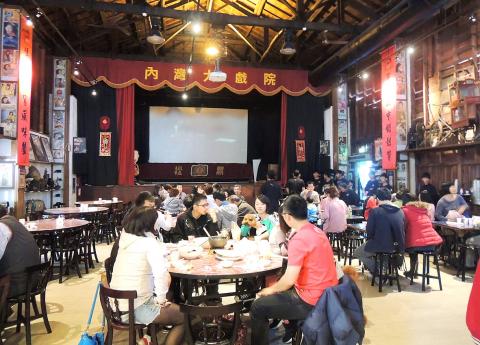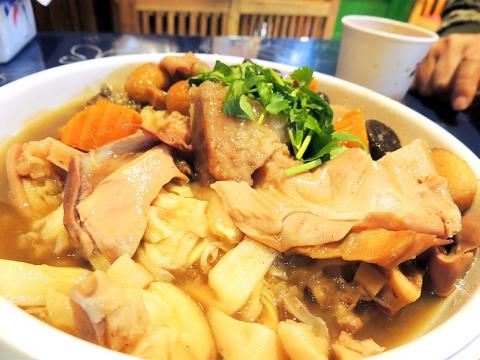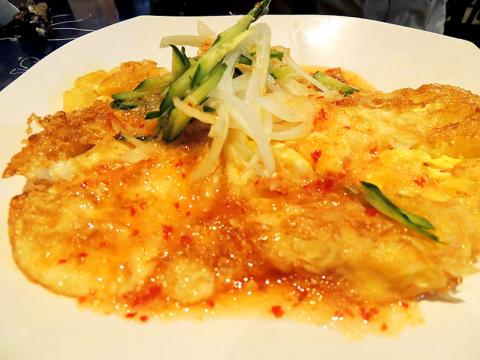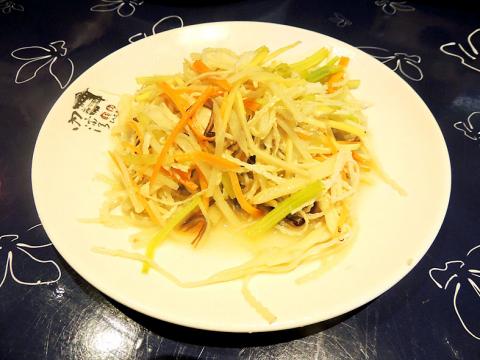Neiwan Theater is a rustic little spot in Hsinchu County that offers Hakka cuisine and a movie.
It’s an old two-story movie theater made of wood, devised without a single beam to prop up the ceiling. A soft light warms the brown walls. Instead of rows of seats, the ground floor and upstairs hold about 20 tables, but the essentials of the theater are still there — a working projector and a respectably wide screen hanging at the front of the room.
The screening schedule isn’t posted, so which old Taiwanese film you see is a matter of chance. Some days, you could get an appetite killer like The Kinmen Bombs (823炮戰). Today, it’s Charlie Chin (秦祥林) whispering to Brigitte Lin (林青霞) in Romance of Clouds (我是一片雲), a love story that quickened heartbeats in the 1970s.

Photo: Enru Lin, Taipei Times
To go with the film, Neiwan Theater offers about 50 hot dishes created by the local population. Neiwan is a former coal-mining village that today is home mainly to the Hakka people, whose cuisine can be identified by some touchstone adjectives: salty, aromatic, heavy on the oil, economical, creative and sparked up by pickles.
Perfection (十全十美, NT$250) is most of the above. It’s an everyday version of Buddha Jumps over the Wall, a Spring Festival dish that often includes top-shelf animal products like abalone and shark fin, and vegetables like ginseng and Japanese flower mushroom. Neiwan Theater’s humbler variant uses bamboo, taro, vermicelli noodles, bits of cured ham and pork tendon, which looks to be the priciest ingredient. Though without grandeur, each component appears to have been prepared the right way — slowly and separately — so that they are equally soft and redolent with oil. The broth is as saltily rich as the shark-fin version, and Perfection still feels like a feast dish.
Neiwan Theater is famous for its betel nut flowers (檳榔花), a NT$150 dish made with the creamy white tufts growing below the leaves of a betel nut tree. These flowers are crispy and pretty palatable, with a flavor like bamboo. They are stir-fried with shaved carrots, celery, onions and some kind of mushroom, served in a hot heap glazed with a thin and delicately saline layer of oil.

Photo: Enru Lin, Taipei Times
There is an army of young servers, notably all boys under 20, who form a line outside the kitchen, taking turns collecting a dish and dispatching it in a tidy flurry of industry. This means that with each dish, you meet a new server, who leaves as quickly as he arrives.
The strangest delivery was Egg Explosion (炸蛋開花, NT$150), which are fried eggs, dressed with chili sauce and served in slices like a pizza. The best was chicken soup with mesona (仙草雞湯, NT$150), which came last. This is roughly a quarter of wild chicken stewed with a handful of goji berries and dried mesona — a small thing that imparts a sweet minty freshness and transforms the broth from good to great.
Neiwan Theater also serves most of the familiar Hakka dishes such as salted pork (客家鹹豬肉, NT$150), oiled chicken (客家油雞腿, NT$200) and prawns steamed in a bamboo case (竹筒蝦, NT$200). Classic Hakka ingredients — available to buy at the street market outside the theater — make repeat occurrences on the menu. There’s a lot of white ginger lily, a fragrant flower with a slight cinnamon aftertaste, and some funky preserved vegetables that make an appearance in eggs, soup and meats.

Photo: Enru Lin, Taipei Times
These preparations are not the most exquisite or ingenious that Hakka cuisine has to offer, but they are better than popcorn. With the reel going, meals here can stretch to three hours or more.

Photo: Enru Lin, Taipei Times

In the March 9 edition of the Taipei Times a piece by Ninon Godefroy ran with the headine “The quiet, gentle rhythm of Taiwan.” It started with the line “Taiwan is a small, humble place. There is no Eiffel Tower, no pyramids — no singular attraction that draws the world’s attention.” I laughed out loud at that. This was out of no disrespect for the author or the piece, which made some interesting analogies and good points about how both Din Tai Fung’s and Taiwan Semiconductor Manufacturing Co’s (TSMC, 台積電) meticulous attention to detail and quality are not quite up to

April 21 to April 27 Hsieh Er’s (謝娥) political fortunes were rising fast after she got out of jail and joined the Chinese Nationalist Party (KMT) in December 1945. Not only did she hold key positions in various committees, she was elected the only woman on the Taipei City Council and headed to Nanjing in 1946 as the sole Taiwanese female representative to the National Constituent Assembly. With the support of first lady Soong May-ling (宋美齡), she started the Taipei Women’s Association and Taiwan Provincial Women’s Association, where she

Chinese Nationalist Party (KMT) Chairman Eric Chu (朱立倫) hatched a bold plan to charge forward and seize the initiative when he held a protest in front of the Taipei City Prosecutors’ Office. Though risky, because illegal, its success would help tackle at least six problems facing both himself and the KMT. What he did not see coming was Taipei Mayor Chiang Wan-an (將萬安) tripping him up out of the gate. In spite of Chu being the most consequential and successful KMT chairman since the early 2010s — arguably saving the party from financial ruin and restoring its electoral viability —

It is one of the more remarkable facts of Taiwan history that it was never occupied or claimed by any of the numerous kingdoms of southern China — Han or otherwise — that lay just across the water from it. None of their brilliant ministers ever discovered that Taiwan was a “core interest” of the state whose annexation was “inevitable.” As Paul Kua notes in an excellent monograph laying out how the Portuguese gave Taiwan the name “Formosa,” the first Europeans to express an interest in occupying Taiwan were the Spanish. Tonio Andrade in his seminal work, How Taiwan Became Chinese,